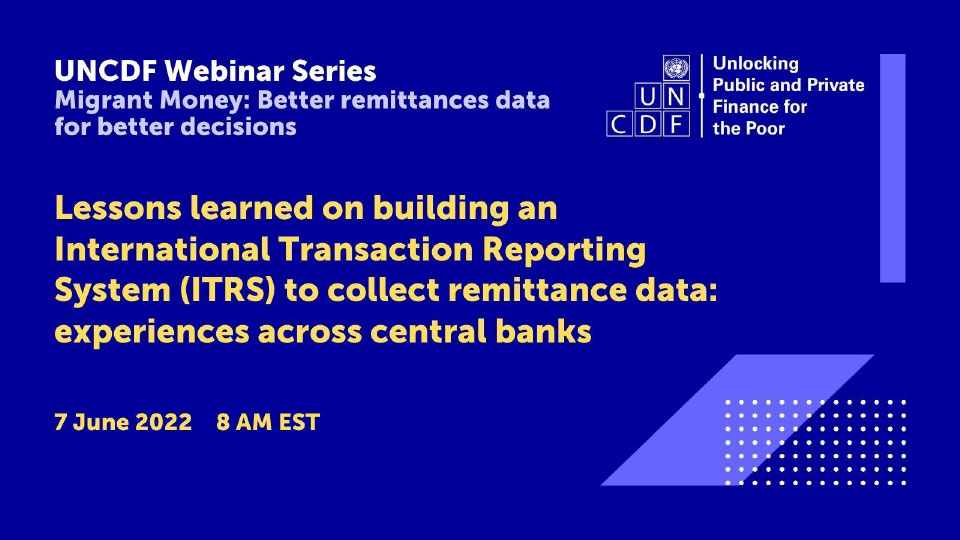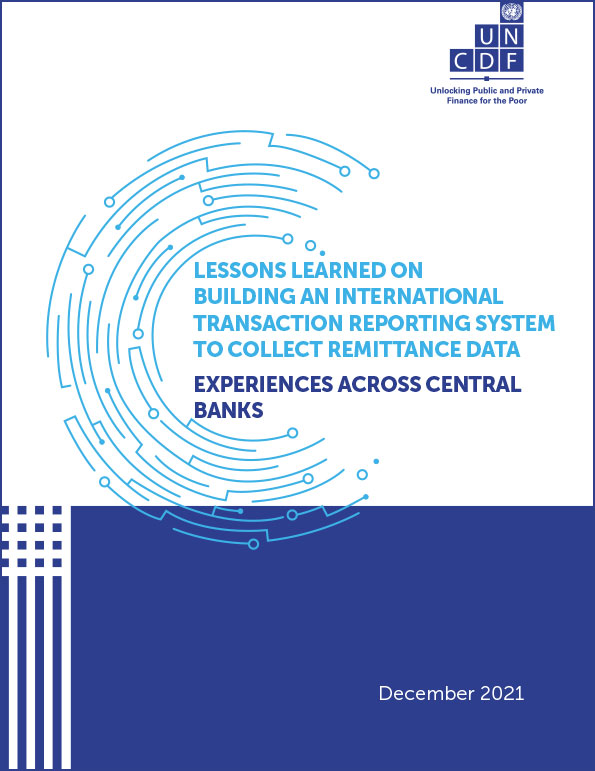To understand remittance markets better, United Nations Capital Development Fund (UNCDF) has consulted with more than fifty central banks and ten technology providers to improve the collection and measurement of cross-border remittances for informing policymaking, product development, and investment. One way to strengthen the policies and processes that facilitate the collection of frequent, accurate remittance data and understanding of remittance markets is to leverage technology to build systems that help collect, monitor, and analyze granular remittance data and drive efficiency and sustainability, reducing costs and improving overall efficiency.
The three webinars on 7, 8 and 9 June covered the following topics:
- 7 June session: Lessons learned on building an international transaction reporting system to collect remittance data: experiences across central bank
- 8 June session: Why do central banks, authorities, and the industry need high-quality granular remittances data? (The case for the collection and analysis of transaction-level, supply-side data on remittances)
- 9 June session: Leverage technology to capture the full potential of remittance system-generated data
Agenda
During the webinar, central banks will share their experiences in the development of tools and systems to improve the collection of remittance flow data and assist central banks in the least developed countries (LDCs).
Agenda
- Opening remarks and introduction to UNCDF
- Presentation of UNCDF’s paper on lessons learned from the Central Banks on building an International Transaction Reporting System (ITRS) to collect remittance data
- Sources of the Remittances data and Balance of Payments Statistics: Experiences of Central Banks of Colombia and the Philippines
- Data automation processes for the collection of remittances payments: SWIFT
- Q&A
- Closing remarks
Speakers
Moderators

Paloma Monroy
Technical Specialist
Migration and Remittances
UNCDF
Paloma Monroy is a Migration and Remittances Specialist and leads the work on international transaction reporting and analysis systems for the UNCDF migration and remittances portfolio. In particular, for improving the quality of disaggregated remittances data to support evidence-based policymaking and for systematic reviews of policies, laws and regulations that limit remittances ecosystems and women’s and males’ economic activity. Her work experience fostering transparency, safety, reliability, and efficiency spans more than 20 international payments and remittances markets.

Ibish Kastrati
Balance of Payments Specialist
Migration and Remittances
UNCDF
Ibish Kastrati has extensive experience with the Central Bank of the Republic of Kosovo (CBK) in establishing the foundations of the External Statistics Department. He has a decade of active involvement in the process of collection, compilation, and dissemination of data in the field of External Sector Statistics (ESS). More specifically, his work involved drafting the legal basis for Kosovo External Statistics; designing new reporting forms (International Transactions Reporting System, Enterprise Surveys, Trade in Goods from Customs, and Administrative Sources); compiling data according to international standards; developing metadata; and preparing tables for publications.
Panelists

Ma. Angelica B. Villena
Deputy Director
Department of Economic Statistics
Bangko Sentral ng Pilipinas (BSP)
Ma. Angelica B. Villena is the Deputy Director of the External Sector Statistics Group (ESSG) of the Department of Economic Statistics (DES) of the BSP. She leads the group responsible for the overall compilation and analysis of external sector statistics, including the country’s balance of payments (BOP) and international investment position (IIP), among others. She earned her Bachelor of Science degree in Business Administration with Accountancy from the University of the Philippines (UP) and Master of Business Administration from the De La Salle University.

Ma. Mercedes Collazos Gaitan
Leader Economist
External Sector area
Banco de la República
María Mercedes Collazos Gaitan is the Leader Economist at the Banco de la República (Central Bank of Colombia). She has been with the bank for about 30 years, currently working as a coordinator of the external sector area, which is responsible for the compilation and dissemination of the Colombian external sector statistics. She has a wide experience in cross-border payments mechanisms and their statistical measurement, and is a co-author of studies on subjects related to the external sector and economic determinants of workers’ remittances, best practices in statistical measurement, and the cost of remittances transactions. An external economist of the sector, she has worked as a short-term expert for the World Bank, CEMLA, and the IMF, in Latin America and Africa..

Michimaru Onizuka
Senior Business Manager
Compliance and Data Expert Team
SWIFT Belgium
Michimaru (Mitch) Onizuka has been working at SWIFT for 28 years. He is currently a senior business manager for SWIFT Data products, focusing on business development of SWIFT Scope solution globally. Prior to this role, Mitch was responsible for the business development of Payments Market Infrastructures in EMEA where he engaged with different central banks, Financial Market Infrastructures and payment service providers. Prior to joining SWIFT, Mitch worked at Citibank and Security Pacific National Bank in Tokyo.
Event Media

Presentation Deck
